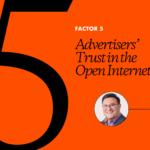If an opinion exists, someone on the internet—whether a commenter, a content creator, or a writer—is likely sharing it at this very moment.
For the tech companies that facilitate our conversations and help publishers monetize, this can lead to some really tough questions. How can we prioritize quality conversations and healthy online environments while still making sure everyone, no matter their opinion, has safe places to express themselves? And how do we do this while empowering publishers to thrive in an increasingly competitive market, where social media platforms occupy so much user time, and own so much user data?
At OpenWeb, we reckon with these questions daily. That comes with the territory, given that we partner with more than 1,000 publishers and brands to facilitate conversations across a network of 100M monthly active users. We also help publishers monetize the content they create by providing users with relevant, context-driven ad experiences.
As a mission-driven tech company, we take our role in this debate very seriously. We are a group of people, prone as anyone else is to our own biases, feelings, opinions, privileges, and world views. We are not arbiters of truth—but with the scale of our work comes a responsibility to live up to our mission to create healthier environments online so that communities, and the publishers and brands that host them, can flourish.
This belief is codified in our Publisher Standards, made public this past July, to reflect our ongoing efforts to balance the need for safer online experiences with our respect for the right to free expression. And we recently released a blog post outlining our thoughts on how to define toxicity and create safer environments online across a wide spectrum of world views.
Sharing our Publisher Standards was a big step in the right direction—now, as an extension of our commitment to transparency, we’re outlining in detail our current process to enforce them.
Enforcing Our Publisher Standards
Our Publisher Standards are a product of the principles which guide us in all relationships with our partners: transparency, diversity of opinion, and due process. We rely heavily on third-party experts and advisors when evaluating publishers to ensure that our decisions are as fair, unbiased, and well-considered as possible.
We’re open about our Standards with our publishers and with the public, and when a partner violates them we wish to work with them to help them improve. Now, let’s outline how we do that.
1. Quarterly Audit and New Partner Reviews
It starts with an audit. Each quarter, we audit each publisher in our network, using two main third-party expert resources: the Global Disinformation Index (GDI) and NewsGuard. Each of these companies deploys a different methodology to track and rank publishers’ credibility and their adherence to journalistic standards. When assessing a prospective partner, we follow this same course of action. If both indexes flag a publisher, we initiate an investigation.
To be clear, the purpose of these investigations is not to compile damning evidence. Rather, we work to understand, in depth, the claims made by our external partners about the given publisher’s content. Then, we consolidate those claims, and present them to the publisher for their feedback and review. This part of the process can take several weeks.
2. Partner Review
Then, we take our concerns to our partner. The goal here is to work with the publisher transparently and in good faith, making sure that they understand their potential violations of our policy.
Now there are two routes a publisher can take: (1) the publisher can make a case for why our third-party experts’ claims are wrong; or (2) they can accept responsibility and take steps to improve. What we are looking for in this step is confirmation that the publisher accepts our standards, and can commit to a plan to meet them.
3. The Verdict
Finally, we bring forth the case—including the findings of the investigation, and a record of the agreements (and any progress) made by the publisher—to a committee of seven internal OpenWeb staff for a vote. This committee has been selected specifically to represent a diversity of backgrounds and experiences—both personal and professional—and worldviews. Each committee member is tasked with voting (and providing reasoning for their decision) on whether the publisher in question has violated our standards, and (if they have) whether their attempts at compliance have been adequate.
If a majority votes to terminate, that’s it: the partnership is terminated, in accordance with our agreement. To date, we’ve terminated more than 55 former partners and declined partnerships with many others.
If the committee determines that the publisher is acting in good faith to improve their standing, we continue to monitor the publishers’ progress and conduct subsequent quarterly reviews, and hold subsequent quarterly committee votes.
Looking Ahead
Underlying this entire process is a deeply held belief that termination of a partner should be the option of last resort, undertaken only in extreme cases, when good-faith efforts have failed. While we acknowledge that it may not be perfect, we believe that this process is a big step toward living up to the promise of our mission.
As a company, we have committed ourselves to fight for a better, more open internet. That means working with publishers and brands of all kinds, across all verticals and the spectrum of opinion, globally to power healthier online experiences—even if we disagree. As we look ahead, we invite all voices online to bring to our attention anything we’ve missed. It’s going to take us all to create a healthier web.


